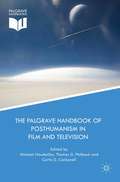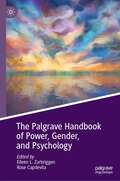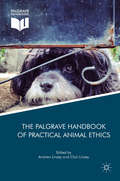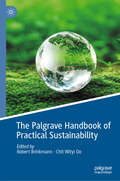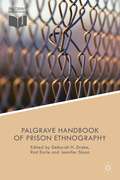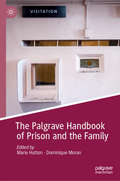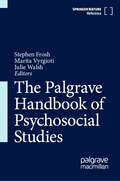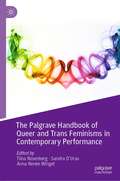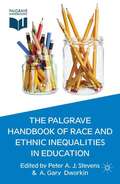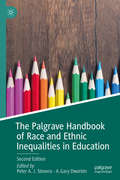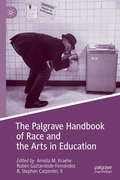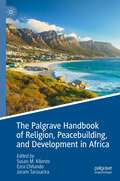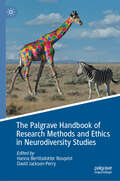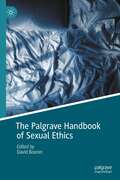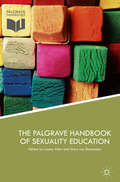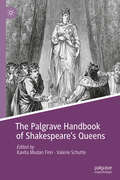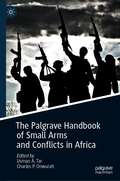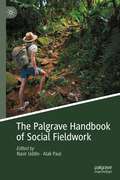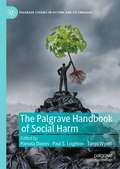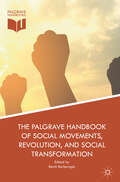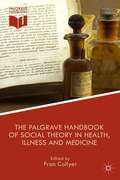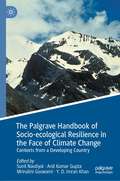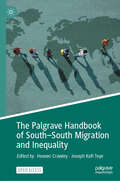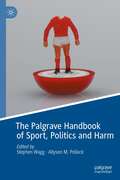- Table View
- List View
The Palgrave Handbook of Posthumanism in Film and Television
by Michael Hauskeller Thomas D. Philbeck Curtis D. CarbonellWhat does popular culture's relationship with cyborgs, robots, vampires and zombies tell us about being human? Insightful scholarly perspectives shine a light on how film and television evince and portray the philosophical roots, the social ramifications and the future visions of a posthumanist world.
The Palgrave Handbook of Power, Gender, and Psychology
by Rose Capdevila Eileen L. ZurbriggenThe Palgrave Handbook of Power, Gender, and Psychology takes an intersectional feminist approach to the exploration of psychology and gender through a lens of power. The invisibility of power in psychological research and theorizing has been critiqued by scholars from many perspectives both within and outside the discipline. This volume addresses that gap. The handbook centers power in the analysis of gender, but does so specifically in relation to psychological theory, research, and praxis. Gathering the work of sixty authors from different geographies, career stages, psychological sub-disciplines, methodologies, and experiences, the handbook showcases creativity in approach, and diversity of perspective. The result is a work featuring a chorus of different voices, including diverse understandings of feminisms and power. Ultimately, the handbook presents a case for the importance of intersectionality and power for any feminist psychological endeavor.
The Palgrave Handbook of Practical Animal Ethics (The Palgrave Macmillan Animal Ethics Series)
by Andrew Linzey Clair LinzeyThis handbook provides an in-depth examination of the practical and theoretical issues within the emerging field of animal ethics. Leading experts from around the globe offer insights into cutting edge topics as diverse as killing for food, religious slaughter, animal companions, aquariums, genetic manipulation, hunting for sport and bullfighting. Including contributions from Lisa Johnson on the themes of human dominance, Thomas White on the ethics of captivity, Mark Bernstein on the ethics of killing and Kay Peggs on the causation of suffering, this handbook offers an authoritative reference work for contemporary applied animal ethics. Progressive in approach, the authors explore the challenges that animal ethics poses both conceptually and practically to traditional understandings of human–animal relations. Key Features: · Structured in four parts to examine the ethics of control, the ethics of captivity, the ethics of killing and the ethics of causing suffering · Interdisciplinary approach including philosophical, historical, scientific, legal, anthropological, religious, psychological and sociological perspectives · Focussed treatment of practical issues such as animals in farming, zoos and animal experimentation The Palgrave Handbook of Practical Animal Ethics is an essential resource for those with an interest in the ethics of modern-day treatment of animals as well as scholars, researchers and advanced students in zoology, philosophy, anthropology, religious studies and sociology.
The Palgrave Handbook of Practical Sustainability
by Robert Brinkmann Chit Wityi OoThis book provides a comprehensive look at practical sustainability around the world. The book takes a distinctly regional, case study perspective and highlights different approaches to managing sustainability challenges. Chapters by authors from all corners of the world look at a range of sustainability issues including environmental sustainability, environmental equity and justice, and government and business approaches to sustainability. The authorship of the book is distinctly global which provides an important perspective to this volume. Each chapter focuses on a different sustainability problem and how it was addressed in the region. Readers will take away a tremendous amount of information as to how sustainability challenges are addressed by leaders throughout the globe.
The Palgrave Handbook of Prison Design (Palgrave Studies in Prisons and Penology)
by Yvonne Jewkes Dominique Moran Kwan-Lamar Blount-Hill Victor St. JohnThis handbook brings together expertise from a range of disciplinary perspectives and geographical contexts to address a key question facing prison policymakers, architects and designers – what kind of carceral environments foster wellbeing, i.e. deliver a rehabilitative, therapeutic environment, or other ‘positive’ outcomes? The Palgrave Handbook of Prison Design offers insights into the construction of custodial facilities, alongside consideration of the critical questions any policymaker should ask in commissioning the building of a site for human containment. Chapters present experience from Australia, Chile, Estonia, Ireland, New Zealand, Norway, Russia, the United Kingdom, and the United States – jurisdictions which vary widely in terms of the history and development of their prison systems, their punitive philosophies, and the nature of their public discourse about the role and purpose of imprisonment, to offer readers theories, frameworks, historical accounts, design approaches, methodological strategies, empirical research, and practical approaches.
The Palgrave Handbook of Prison Ethnography
by Deborah H. Drake Rod Earle Jennifer SloanWith a foreword by Professor Yvonne Jewkes, University of Leicester, UK. ThePalgrave Handbook of Prison Ethnography provides an expansive overview of the challenges presented by qualitative, and particularly ethnographic, enquiry. The chapters reflect upon the means by which ethnographers aim to gain understanding, make sense of what they learn and the way they represent their finished work. The Handbook offers urgent insights relevant to current trends in the growth of imprisonment worldwide. In an era of mass incarceration, human-centric ethnography provides an important counter to quantitative analysis and the audit culture on which prisons are frequently judged. The Handbook is divided into four parts. Part I ('About Prison Ethnography') assesses methodological, theoretical and pragmatic issues related to the use of ethnographic and qualitative enquiry in prisons. Part II ('Through Prison Ethnography') considers the significance of ethnographic insights in terms of wider social or political concerns. Part III ('Of Prison Ethnography') analyses different aspects of the roles ethnographers take and how they negotiate their research settings. Part IV ('For Prison Ethnography') includes contributions that convincingly extend the value of prison ethnography beyond the prison itself. Bringing together contributions by some of the world's leading scholars in criminology and prison studies, this authoritative volume maps out new directions for future research. It will be an indispensable resource for practitioners, students, academics and researchers who use qualitative social research methods to further their understanding of prisons.
The Palgrave Handbook of Prison and the Family (Palgrave Studies in Prisons and Penology)
by Dominique Moran Marie HuttonThis handbook brings together the international research focussing on prisoners’ families and the impact of imprisonment on them. Under-researched and under-theorised in the realm of scholarship on imprisonment, this handbook encompasses a broad range of original, interdisciplinary and cross-national research. This volume includes the experiences of those from countries often unrepresented in the prisoner’s families’ literature such as Russia, Australia, Israel and Canada. This broad coverage allows readers to consider how prisoners’ families are affected by imprisonment in countries embracing very different penal philosophies; ranging from the hyper-incarceration being experienced in the USA to the less punitive, more welfare-orientated practices under Scandinavian ‘exceptionalism’. Chapters are contributed by scholars from numerous and diverse disciplines ranging from law, nursing, criminology, psychology, human geography, and education studies. Furthermore, contributions span various methodological and epistemological approaches with important contributions from NGOs working in this area at a national and supranational level. The Palgrave Handbook of Prison and the Family makes a significant contribution to knowledge about who prisoners’ families are and what this status means in practice. It also recognises the autonomy and value of prisoners’ families as a research subject in their own right.
The Palgrave Handbook of Psychosocial Studies
by Stephen Frosh Julie Walsh Marita VyrgiotiOver the past decades, psychosocial studies has demonstrated its strengths and influence across diverse sites of theory and practice; it continues to grow as an area of transdisciplinary research that dialogues with psychoanalysis, sociology, critical psychology, cultural studies, gender and sexuality studies, and postcolonial studies. The Palgrave Handbook of Psychosocial Studies is the first Major Reference Work to explore the history and depth of the field and offer a critical evaluation of contemporary theories, empirical methods and practices of psychosocial studies. With 50 chapters, this state-of-the-art collection:· reflects back on texts that have influenced the development of psychosocial studies from a 2020s perspective· explores current major topics with evaluative reviews· identifies newly emerging areas ofenquiry · features a wide range of international psychosocial voices. Published chapters can be read and downloaded individually online: https://link.springer.com/referencework/10.1007/978-3-030-61510-9 The Palgrave Handbook of Psychosocial Studies is unique in covering a wide range of psychosocial topics and in being written accessibly from many different perspectives. It will appeal to students, scholars and practitioner-researchers alike.
The Palgrave Handbook of Queer and Trans Feminisms in Contemporary Performance
by Tiina Rosenberg Sandra D’Urso Anna Renée WingetThe purpose of this Handbook is to provide students with an overview of key developments in queer and trans feminist theories and their significance to the field of contemporary performance studies. It presents new insights highlighting the ways in which rigid or punishing notions of gender, sexuality and race continue to flourish in systems of knowledge, faith and power which are relevant to a new generation of queer and trans feminist performers today.The guiding question for the Handbook is: How do queer and trans feminist theories enhance our understanding of developments in feminist performance today, and will this discussion give rise to new ways of theorizing contemporary performance? As such, the volume will survey a new generation of performers and theorists, as well as senior scholars, who engage and redefine the limits of performance. The chapters will demonstrate how intersectional, queer and trans feminist theoretical tools support new analyses of performance with a global focus. The primary audience will be students of theatre/ performance studies as well as queer /gender studies. The volume’s contents suggest close links between the formation of queer feminist identities alongside recent key political developments with transnational resonances. Furthermore, the emergence of new queer and trans feminist epistemologies prompts a reorientation regarding performance and identities in a 21st-century context.
The Palgrave Handbook of Race and Ethnic Inequalities in Education
by Peter A. J. Stevens A. Gary DworkinThis authoritative, state-of-the-art reference work provides the first systematic review to date of how sociologists have studied the relationship between race/ethnicity and educational inequality in eighteen different national contexts: Argentina, Australia, Austria, Belgium, Brazil, Canada, China, Cyprus, Finland, France, England, Germany, Ireland, Japan, Russia, South Africa, the Netherlands and the USA. Using a similar, comprehensive literature review methodology, national experts critically review how sociologists have studied race and ethnic inequalities in education over the last thirty years. The analysis focuses on the main research traditions that developed over time and their relationships with developments in social policy and social thought. This book ultimately integrates the findings of the national reviews and maps out new directions for future research. Additionally, the editors explore how national contexts of race/ethnic relations shape the character and content of educational inequalities. Global in its perspective and definitive in content, this one-stop volume will be an indispensable reference resource for a wide range of academics, students and researchers in the fields of education, sociology, race and ethnicity studies and social policy.
The Palgrave Handbook of Race and Ethnic Inequalities in Education
by Peter A. J. Stevens A. Gary DworkinThis authoritative, state-of-the-art reference work builds on its first edition to provide a cutting-edge systematic review of the relationship between race/ethnicity and educational inequality. Studying 25 different national contexts drawn from every inhabited continent on earth and building upon material from the earlier edition, the work analyses educational policies, practices and research on minority students, immigrants and refugees. The editors and contributors explore principal research traditions from countries as diverse as Argentina, China, Norway and South Africa, examining the factors promoting social cohesion as well as considerations regarding the use of international test score data. Seamlessly integrating findings of national reviews, the editors and contributors analyse how national contexts of race/ethnic relations shape the character and content of educational inequalities, and deftly map out new directions for future research in the area.Global in its perspective and definitive in content, this one-stop volume will be an indispensable reference resource for a wide range of academics, students and researchers in the fields of education, sociology, race and ethnicity studies and social policy.Chapter 20 of this book is available open access under a CC BY 4.0 license at link.springer.com
The Palgrave Handbook of Race and the Arts in Education
by Amelia M. Kraehe Rubén Gaztambide-Fernández B. Stephen Carpenter IIThe Palgrave Handbook of Race and the Arts in Education is the first edited volume to examine how race operates in and through the arts in education. Until now, no single source has brought together such an expansive and interdisciplinary collection in exploration of the ways in which music, visual art, theater, dance, and popular culture intertwine with racist ideologies and race-making. Drawing on Critical Race Theory, contributing authors bring an international perspective to questions of racism and anti-racist interventions in the arts in education. The book’s introduction provides a guiding framework for understanding the arts as white property in schools, museums, and informal education spaces. Each section is organized thematically around historical, discursive, empirical, and personal dimensions of the arts in education. This handbook is essential reading for students, educators, artists, and researchers across the fields of visual and performing arts education, educational foundations, multicultural education, and curriculum and instruction.
The Palgrave Handbook of Religion, Peacebuilding, and Development in Africa
by Ezra Chitando Joram Tarusarira Susan M. KilonzoThis Handbook explores the ways in which religion among the African people has been applied in situations of conflict and violence to contribute to sustainable peace and development. It analyzes how peacebuilding inspired and enabled by religion serves as the foundation for sustainable development in Africa, while also acknowledging that religion can also be a tool of destruction, and can be used to fuel violence and underdevelopment. Contributors to this volume offer theoretical discussions from existing literature, as well as experiences of practitioners, to deepen the readers’ understanding on the role of religion and religious institutions in peacebuilding and development in Africa. The Handbook provides reflections on possible future developments as well, thereby aligning with the goals of SDG 16.
The Palgrave Handbook of Research Methods and Ethics in Neurodiversity Studies
by Hanna Bertilsdotter Rosqvist David Jackson-PerryThis timely volume brings together well-established scholars and emerging voices to explore research methods and ethics in Neurodiversity Studies. It explores the epistemic injustice that currently surrounds much knowledge production around neurodivergence, and offers concrete examples of creative, participatory, and collaborative research practice in the field. The editors have assembled chapters combining reflexive, theoretical, and practical contributions. Together they address current debates surrounding participatory methods and Neurodiversity Studies and are unique in giving voice to mainly neurodivergent researchers and contributors across autism, ADHD, acquired brain injury, and multiple neurodivergence. The first of its kind, this much-needed volume contains essential reading for all those learning and teaching in the field of neurodiversity. It further represents a valuable resource for students and academics at all levels, participatory or creative researchers, research commissioners, and research evidence users across the social sciences.
The Palgrave Handbook of Sexual Ethics
by David BooninThe Palgrave Handbook of Sexual Ethics is a comprehensive collection of recent research on the ethics of sexual behavior, representing a wide range of perspectives. It addresses a number of traditional subjects in the area, including questions about pre-marital, extra-marital, non-heterosexual, and non-procreative sex, and about the nature and significance of sexual consent, sexual desire, and sexual activity, as well as a variety of more recent topics, including sexual racism, sexual ableism, sex robots, and the #metoo response to sexual harassment. Each chapter defends a substantive thesis about the topic it addresses and the handbook as a whole thereby provides a strong foundation for future research in this important and growing field of inquiry.
The Palgrave Handbook of Sexuality Education
by Louisa Allen Mary Lou RasmussenThis authoritative, state-of-the-art Handbook provides an authoritative overview of issues within sexuality education, coupled with ground-breaking discussion of emerging and unconventional insights in the field. With 32 contributions from 12 countries it definitively traces the landscape of issues, theories and practices in sexuality education globally. These rich and multidisciplinary essays are written by renowned critical sexualities studies experts and rising stars in this area and grouped under four main areas:Global Assemblages of Sexuality EducationSexualities Education in SchoolsSexual Cultures, Entertainment Media and Communication TechnologiesRe-animating What Else Sexuality Education Research Can Do, Be and BecomeImportantly, this Handbook does not equate sexuality education with safer sex education nor understand this subject as confined to school based programmes. Instead, sexuality education is understood more broadly and to occur in spaces as diverse as community settings and entertainment media, and via communication technologies. It is an essential and comprehensive reference resource for academics, students and researchers of sexuality education that both demarcates the field and stimulates critical discussion of its edges. Chapter 2 is available open access under a CC BY 4.0 license via link.springer.com.
The Palgrave Handbook of Shakespeare's Queens (Queenship and Power)
by Valerie Schutte Kavita Mudan FinnOf Shakespeare’s thirty-seven plays, fifteen include queens. This collection gives these characters their due as powerful early modern women and agents of change, bringing together new perspectives from scholars of literature, history, theater, and the fine arts. Essays span Shakespeare’s career and cover a range of famous and lesser-known queens, from the furious Margaret of Anjou in the Henry VI plays to the quietly powerful Hermione in The Winter’s Tale; from vengeful Tamora in Titus Andronicus to Lady Macbeth. Early chapters situate readers in the critical concerns underpinning any discussion of Shakespeare and queenship: the ambiguous figure of Elizabeth I, and the knotty issue of gender presentation. The focus then moves to analysis of issues such as motherhood, intertextuality, and contemporary political contexts; close readings of individual plays; and investigations of rhetoric and theatricality. Featuring twenty-five chapters with a rich variety of themes and methodologies, this handbook is an invaluable reference for students and scholars, and a unique addition to the fields of Shakespeare and queenship studies.
The Palgrave Handbook of Small Arms and Conflicts in Africa
by Usman A. Tar Charles P. OnwurahThis handbook provides critical analyses of the theory and practices of small arms proliferation and its impact on conflicts and organized violence in Africa. It examines the terrains, institutions, factors and actors that drive armed conflict and arms proliferation, and further explores the nature, scope, and dynamics of conflicts across the continent, as well as the extent to which these conflicts are exacerbated by the proliferation of small arms. The volume features rich analyses by contributors who are acquainted with, and widely experienced in, the formal and informal structures of arms proliferation and control, and their repercussions on violence, instability and insecurity across Africa. The chapters dissect the challenges of small arms and light weapons in Africa with a view to understanding roots causes and drivers, and generating a fresh body of analyses that adds value to the existing conversation on conflict management and peacebuilding in Africa. With contributions from scholars, development practitioners, defence and security professionals and civil society activists, the handbook seeks to serve as a reference for students, researchers, and policy makers on small arms proliferation, control and regulation; defence and security practitioners; and those involved in countering violence and managing conflicts in Africa.
The Palgrave Handbook of Social Fieldwork
by Nasir Uddin Alak PaulThis handbook offers epistemologically and ontologically important personal accounts of academic and professional researchers having long-term intensive, comprehensive and ethnographic fieldwork in various social settings and versatile regional contexts across the globe. The accounts are cross-disciplinary including anthropology, sociology, geography, political sciences, gender studies, forestry and environmental studies, economics, and international relations. They are also trans-regional, covering the globe including South Asia, Southeast Asia, Africa, Europe, Latin America and North America. The book offers a comprehensive portrait of multifaceted challenges that social researchers experience while doing fieldwork in various social settings. The accounts provide both challenges of doing fieldwork in the 21st century and the ways how to address/redress them in the field by complying with the codes of ethics, and the politics of fieldwork. Readers will benefit from the handbook by understanding methodological issues from both disciplinary relevance and regional specificity across time and spaces.
The Palgrave Handbook of Social Harm (Palgrave Studies in Victims and Victimology)
by Pamela Davies Paul Leighton Tanya WyattThis handbook explores the concept of 'harm' in criminological scholarship and lays the foundation for a future zemiological agenda. 'Social harm' as a theoretical construct has become established as an alternative, broader lens through which to understand the causation and alleviation of widespread harm in society, thus moving beyond criminology and state definitions of crime and extending the range of criminological research. Applying zemiological concepts, this book comprehensively explores topics including violence, moral indifference, workplace injury, corporate and state harms, animal rights, migration, gender, poverty, security and victimisation. This definitive work covers theory, research, scholarship and future visions across four sections, and includes contributions from areas such as criminology, sociology, socio-legal and cultural studies, social policy and international relations. It offers readers up-to-date, original theoretical perspectives and an analysis of a broad range of issues from a 'social harm' perspective.
The Palgrave Handbook of Social Movements, Revolution, and Social Transformation
by Berch BerberogluThis handbook on social movements, revolution, and social transformation analyzes people’s struggles to bring about social change in the age of globalization. It examines the origins, nature, dynamics, and challenges of such movements as they aim to change dominant social, economic, and political institutions and structures across the globe. Departing from a theoretical introduction that explores major classical and contemporary theories of social movements and transformation, the contributions collected here use a class-based approach to examine key cases of social movements, rebellions, and revolutions worldwide from the turn of the twentieth to the early twenty-first centuries. Against this wide-ranging background, the handbook concludes by charting the varied and competing future developments and trajectories of social movements, revolutions, and social transformations.
The Palgrave Handbook of Social Theory in Health, Illness and Medicine
by Fran CollyerThis wide-reaching handbook offers a new perspective on the sociology of health, illness and medicine by stressing the importance of social theory. Examining a range of classic and contemporary female and male theorists from across the globe, it explores various issues including chronic illness, counselling and the rising problems of obesity.
The Palgrave Handbook of Socio-ecological Resilience in the Face of Climate Change: Contexts from a Developing Country
by Anil Kumar Gupta Sunil Nautiyal Mrinalini Goswami Y. D. Imran KhanThis book shares experiences and knowledge on climate change impacts and adaptation, risk reduction strategies, communities’ responses, and best practices from different landscapes of India. It provides insights into climate change risk reduction in trans-disciplinary frameworks. The findings and discussions put forward in the chapters, largely based on micro-level case studies, provide an in-depth understanding of interactions among ecology, society, and economy under different conditions of changing climate. It contains critical discussion on both existing and required actions as adjustments to climate change impacts by different actors at diverse scales and contexts. The recommendations will be beneficial in climate change adaptation planning for India and other developing countries, where a large portion of the population directly depends on climate-sensitive sectors. The content of the book is interdisciplinary and it will be beneficial for scholars and practitioners from natural science, social science, policy, and governance across the continents.
The Palgrave Handbook of South–South Migration and Inequality
by Heaven Crawley Joseph Kofi TeyeThis open access handbook examines the phenomenon of South-South migration and its relationship to inequality in the Global South, where at least a third of all international migration takes place. Drawing on contributions from nearly 70 leading migration scholars, mainly from the Global South, the handbook challenges dominant conceptualisations of migration, offering new perspectives and insights that can inform theoretical and policy understandings and unlock migration’s development potential. The handbook is divided into four parts, each highlighting often overlooked mobility patterns within and between regions of the Global South, as well as the inequalities faced by those who move. Key cross-cutting themes include gender, race, poverty and income inequality, migration decision making, intermediaries, remittances, technology, climate change, food security and migration governance. The handbook is an indispensable resource on South-South migration and inequality for academics, researchers, postgraduates and development practitioners.
The Palgrave Handbook of Sport, Politics and Harm
by Stephen Wagg Allyson M. PollockThis book looks historically at the harm that has been inflicted in the practice of sport and at some of the issues, debates and controversies that have arisen as a result. Written by experts in history, sociology, sport journalism and public health, the book considers sport and injury in relation to matters of social class; gender; ethnicity and race; sexuality; political ideology and national identity; health and wellbeing; childhood; animal rights; and popular culture. These matters are, in turn, variously related to a range of sports, including ancient, pre- and early industrial sports; American football; boxing; wrestling and other combat sports; mountaineering; horseracing; cycling; motor racing; rugby football; cricket; association football; baseball; basketball; Crossfit; ice hockey; Olympic sports; Mixed Martial Arts; and sport in an imagined dystopian future.
